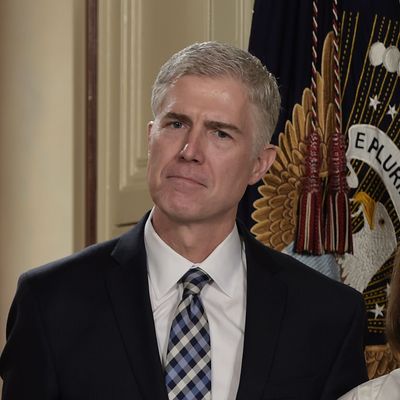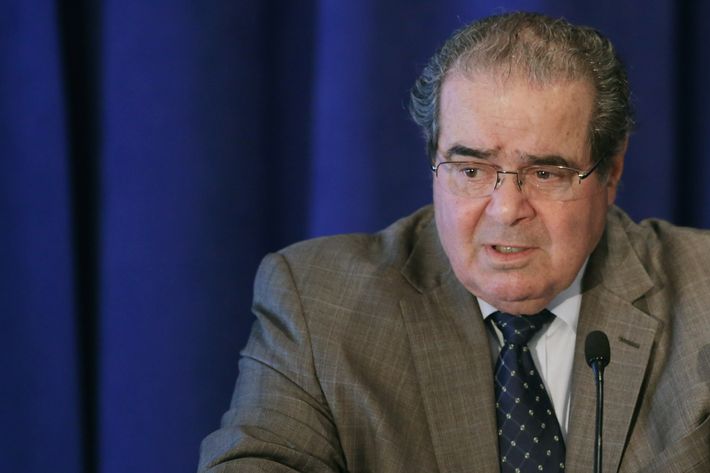
Bringing to a faux-dramatic close a process that was central to his conquest and seduction of serious conservatives, Donald Trump has chosen Tenth Circuit Court of Appeals Judge Neil Gorsuch of Colorado as his nominee for the Supreme Court seat vacated by the death of Justice Antonin Scalia nearly a year ago.
Trump told a solid half-truth at the beginning of his odd, live-TV event announcing Gorsuch: He bragged about keeping his promise about the Supreme Court — and he did. But it was a promise to conservatives, not to “the American people” at large, as he suggested in his remarks. Gorsuch became the favorite for the gig in recent days, after Team Trump let it be known that Trump’s short list was down to three; the other two, Eleventh Circuit Judge William H. Pryor Jr. and Third Circuit Judge Thomas Hardiman, were plagued by last-minute fears from conservative activists that they were not rock-solid enough in their views on, respectively, religious liberty and abortion. Pryor was also considered a potential risk for confirmation thanks to his very outspoken condemnation of Roe v. Wade.
Indeed, by the time Trump revealed Gorsuch as his choice, he had almost overplayed the game. The suspense was exacerbating fears on the right about someone else getting the prize in a way that exaggerated intensity. Conservative judicial activists, you see, hate suspense when it comes to Republican Supreme Court nominees — they have been burned so many times before. From Dwight D. Eisenhower through Poppy Bush, every post-World War II GOP president before Bush 43 has managed to put somebody on the Court who has extended or defended some key liberal tenet of constitutional law. In 1992, the last time the landmark abortion-rights decision of Roe v. Wade looked ripe for overturning (far and away the most common and fiercely held goal for conservative activists), the five-judge majority that saved Roe was made up entirely of justices appointed by Republican presidents.
So of course, conservatives did not trust Donald Trump to do the right thing about SCOTUS, and his own history of social liberalism did not help. Thus, a key part of his efforts to bring strong ideological conservatives (and especially SCOTUS-obsessed, conservative, evangelical activists) into his camp after winning the GOP presidential nomination involved the most elaborate process of public SCOTUS-vetting ever.
In May of last year, Trump unveiled a list of 11 potential candidates for Scalia’s seat that had been precleared by the rigorous legal conservatives of the Federalist Society and the all-purpose ideologues of the Heritage Foundation. Hardiman and Pryor were on that list. Then, in September, he released a final list of 21 vetted prospects for the Scalia seat; Gorsuch made that last cut.
It was no accident that, during the announcement, Trump mentioned his determination to choose someone in the Scalia tradition. Gorsuch does not have the perceived shortcomings of Hardiman and Pryor, and he does have a lot of positives in the eyes of the activists for whom his nomination was a gift-wrapped present and campaign thank-you note. His legal thinking and writing style remind a lot of legal beagles of Scalia, who — with the possible exception of his protégé, Clarence Thomas — had long been conservative ideologues’ favorite justice. SCOTUSblog’s Eric Citron said of Gorsuch: “[O]ne study has identified him as the most natural successor to Justice Antonin Scalia on the Trump short list, both in terms of his judicial style and his substantive approach.”

But the key reason for conservative enthusiasm about Gorsuch is that he has been a real judicial pioneer in recognizing and expanding the right to an exemption from anti-discrimination laws and regulations for those citing religious objections. He was involved in two Tenth Circuit cases that wound up producing SCOTUS landmark decisions that allowed religious believers (include those running for-profit businesses) to disregard the contraception-coverage provisions of Obamacare. This background is worth its weight in gold when it comes to the Christian right’s reactions to Trump’s SCOTUS choice.
For older conservatives, it may actually matter that Gorsuch comes from good stock: He’s the son of Ronald Reagan’s first EPA administrator, Anne Gorsuch Burford, who was sort of the Scott Pruitt of that era (though, in some respects, Pruitt makes her look like Rachel Carson). And for everyone on the right, his age is a big plus; at 49, with any luck, he can help bend the Court in a starboard direction for three decades or more. That would be a conservative legacy for Trump that would last well beyond the next several partisan exchanges in control of the White House.
There will, of course, be talk of Democrats asking Gorsuch tough questions during confirmation hearings, and he’s not the sort of judge who is likely to exert much bipartisan appeal. The donkey party will have to decide whether to filibuster this nomination, and the elephant party will have to decide whether to kill the filibuster in SCOTUS debates once and for all. Unless something unexpected comes up, however, Democrats probably should not imagine they can convince enough Senate Republicans to cross the barricades to defeat Gorsuch altogether. The GOP did not spend ten months denying hearings and a vote for Obama’s nominee, Merrick Garland, only to fall apart over a GOP president’s pick. And you had better believe that the GOP’s conservative “base” would wreak holy hell on any Republican who breaks ranks on this, the single most important reason they came around to Trump in 2016.
Speaking of Trump: His reward for nominating a reliable conservative to the Court is to keep many conservative ideologues in his corner, as he seeks to consummate his conquest of the GOP in 2017 and beyond. He may well need them to keep congressional Republicans in line. But when it comes to crucial constitutional issues like abortion, putting Gorsuch on the Court may simply whet conservative appetites. By most accounts, they would need another justice to overturn Roe v. Wade. If another opening on the Court appears while Trump is in office, the pressure on him to get it right — and right — will make the path to this nomination look like, well, a reality TV show.






























